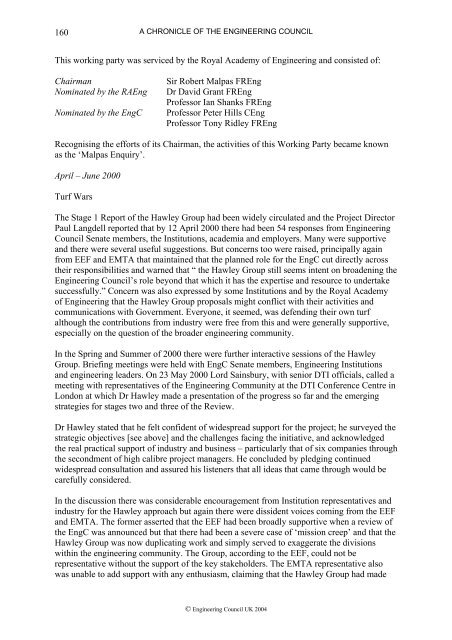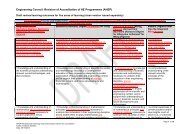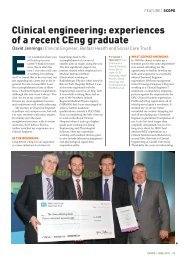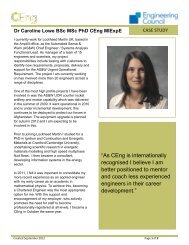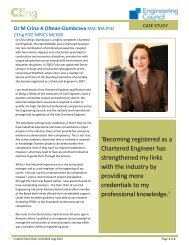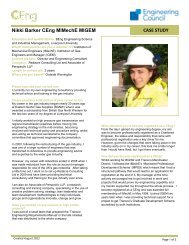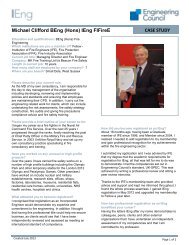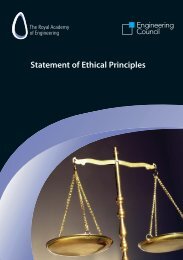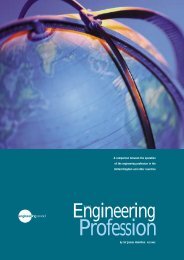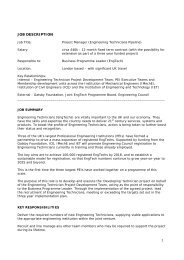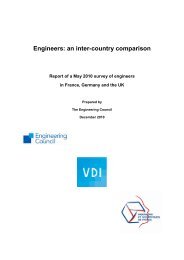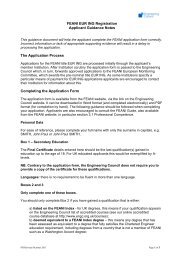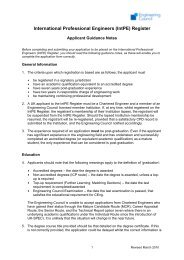An Engine for Change - A Chronicle of the Engineering Council
An Engine for Change - A Chronicle of the Engineering Council
An Engine for Change - A Chronicle of the Engineering Council
Create successful ePaper yourself
Turn your PDF publications into a flip-book with our unique Google optimized e-Paper software.
160A CHRONICLE OF THE ENGINEERING COUNCILThis working party was serviced by <strong>the</strong> Royal Academy <strong>of</strong> <strong>Engine</strong>ering and consisted <strong>of</strong>:ChairmanNominated by <strong>the</strong> RAEngNominated by <strong>the</strong> EngCSir Robert Malpas FREngDr David Grant FREngPr<strong>of</strong>essor Ian Shanks FREngPr<strong>of</strong>essor Peter Hills CEngPr<strong>of</strong>essor Tony Ridley FREngRecognising <strong>the</strong> ef<strong>for</strong>ts <strong>of</strong> its Chairman, <strong>the</strong> activities <strong>of</strong> this Working Party became knownas <strong>the</strong> ‘Malpas Enquiry’.April – June 2000Turf WarsThe Stage 1 Report <strong>of</strong> <strong>the</strong> Hawley Group had been widely circulated and <strong>the</strong> Project DirectorPaul Langdell reported that by 12 April 2000 <strong>the</strong>re had been 54 responses from <strong>Engine</strong>ering<strong>Council</strong> Senate members, <strong>the</strong> Institutions, academia and employers. Many were supportiveand <strong>the</strong>re were several useful suggestions. But concerns too were raised, principally againfrom EEF and EMTA that maintained that <strong>the</strong> planned role <strong>for</strong> <strong>the</strong> EngC cut directly across<strong>the</strong>ir responsibilities and warned that “ <strong>the</strong> Hawley Group still seems intent on broadening <strong>the</strong><strong>Engine</strong>ering <strong>Council</strong>’s role beyond that which it has <strong>the</strong> expertise and resource to undertakesuccessfully.” Concern was also expressed by some Institutions and by <strong>the</strong> Royal Academy<strong>of</strong> <strong>Engine</strong>ering that <strong>the</strong> Hawley Group proposals might conflict with <strong>the</strong>ir activities andcommunications with Government. Everyone, it seemed, was defending <strong>the</strong>ir own turfalthough <strong>the</strong> contributions from industry were free from this and were generally supportive,especially on <strong>the</strong> question <strong>of</strong> <strong>the</strong> broader engineering community.In <strong>the</strong> Spring and Summer <strong>of</strong> 2000 <strong>the</strong>re were fur<strong>the</strong>r interactive sessions <strong>of</strong> <strong>the</strong> HawleyGroup. Briefing meetings were held with EngC Senate members, <strong>Engine</strong>ering Institutionsand engineering leaders. On 23 May 2000 Lord Sainsbury, with senior DTI <strong>of</strong>ficials, called ameeting with representatives <strong>of</strong> <strong>the</strong> <strong>Engine</strong>ering Community at <strong>the</strong> DTI Conference Centre inLondon at which Dr Hawley made a presentation <strong>of</strong> <strong>the</strong> progress so far and <strong>the</strong> emergingstrategies <strong>for</strong> stages two and three <strong>of</strong> <strong>the</strong> Review.Dr Hawley stated that he felt confident <strong>of</strong> widespread support <strong>for</strong> <strong>the</strong> project; he surveyed <strong>the</strong>strategic objectives [see above] and <strong>the</strong> challenges facing <strong>the</strong> initiative, and acknowledged<strong>the</strong> real practical support <strong>of</strong> industry and business – particularly that <strong>of</strong> six companies through<strong>the</strong> secondment <strong>of</strong> high calibre project managers. He concluded by pledging continuedwidespread consultation and assured his listeners that all ideas that came through would becarefully considered.In <strong>the</strong> discussion <strong>the</strong>re was considerable encouragement from Institution representatives andindustry <strong>for</strong> <strong>the</strong> Hawley approach but again <strong>the</strong>re were dissident voices coming from <strong>the</strong> EEFand EMTA. The <strong>for</strong>mer asserted that <strong>the</strong> EEF had been broadly supportive when a review <strong>of</strong><strong>the</strong> EngC was announced but that <strong>the</strong>re had been a severe case <strong>of</strong> ‘mission creep’ and that <strong>the</strong>Hawley Group was now duplicating work and simply served to exaggerate <strong>the</strong> divisionswithin <strong>the</strong> engineering community. The Group, according to <strong>the</strong> EEF, could not berepresentative without <strong>the</strong> support <strong>of</strong> <strong>the</strong> key stakeholders. The EMTA representative alsowas unable to add support with any enthusiasm, claiming that <strong>the</strong> Hawley Group had made© <strong>Engine</strong>ering <strong>Council</strong> UK 2004


